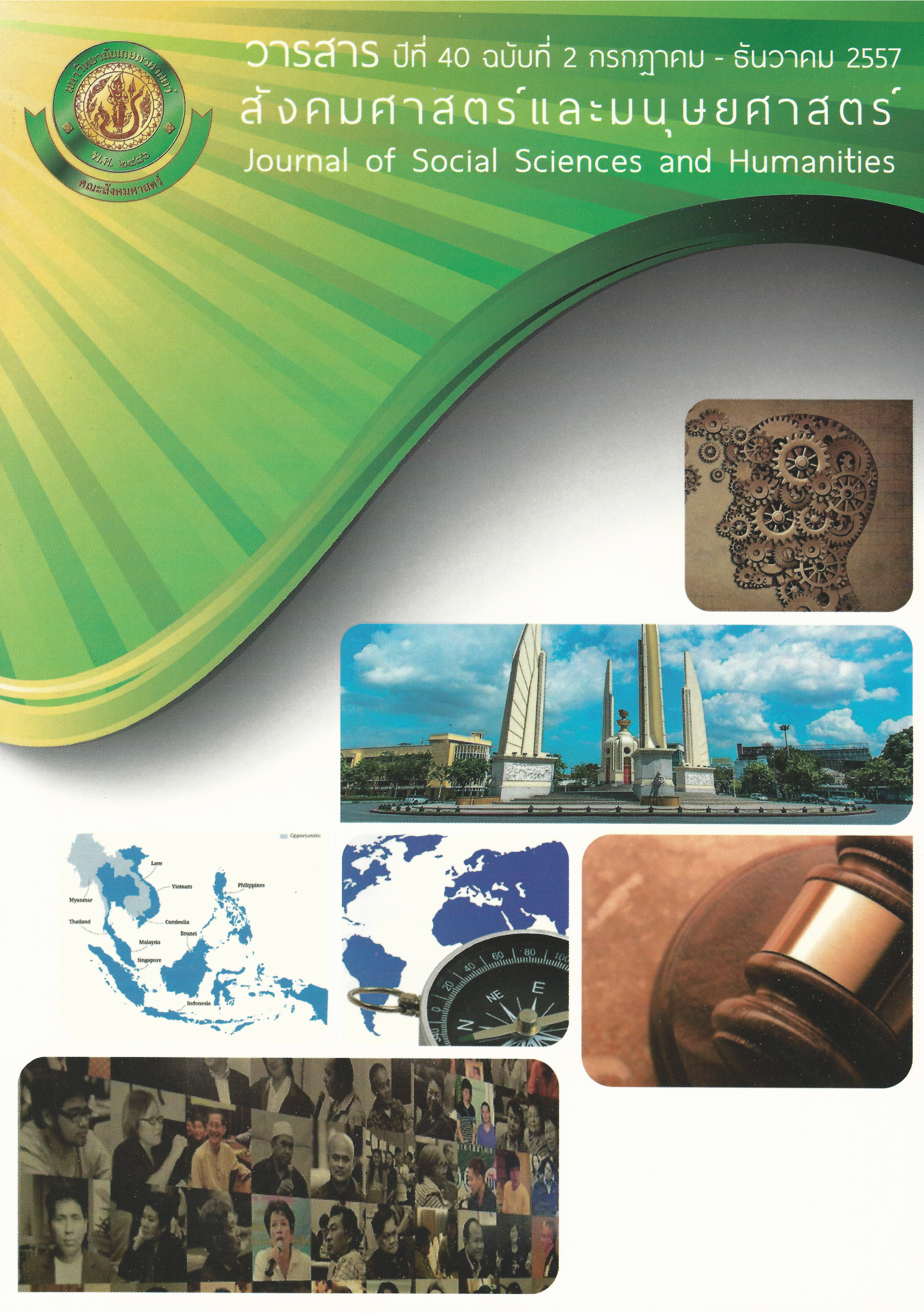คุณภาพชีวิตสตรีมุสลิมในชุมชนตำบลคลองตะเคียน อำเภอพระนครศรีอยุธยา จังหวัดพระนครศรีอยุธยา
Main Article Content
บทคัดย่อ
การวิจัยครั้งนี้เป็นการศึกษาคุณภาพชีวิตสตรีมุสลิมโดยมีวัตถุประสงค์เพื่อศึกษาคุณภาพชีวิตสตรีมุสลิมในชุมชนตำบลคลองตะเคียนอำเภอพระนครศรีอยุธยา จังหวัดพระนครศรีอยุธยา และเพื่อศึกษาปัจจัยสำคัญบางประการที่มีความสัมพันธ์กับคุณภาพชีวิตสตรีมุสลิมในชุมชนตำบลคลองตะเคียน อำเภอพระนครศรีอยุธยา จังหวัดพระนครศรีอยุธยา วิธีการศึกษาเป็นการศึกษาจากกลุ่มตัวอย่างสตรีมุสลิมในชุมชนตำบลคลองตะเคียน ในช่วงเดือนตุลาคม พ.ศ. 2553 ถึงเดือนธันวาคม พ.ศ. 2553 ซึ่งใช้วิธีชักตัวอย่างแบบบังเอิญจำนวน 400 คน ใช้แบบสอบถามในการเก็บรวบรวมข้อมูล สถิติที่ใช้ในการวิเคราะห์ ได้แก่ การแจกแจงความถี่ ร้อยละ ค่าเฉลี่ย ส่วนเบี่ยงเบนมาตรฐาน ค่าสัมประสิทธิ์สหสัมพันธ์เพียร์สัน ค่าสัมประสิทธิ์สหสัมพันธ์พอยท์ไบซีเรียล และการวิเคราะห์ถดถอยพหุแบบขั้นตอน นอกจากนี้ยังใช้วิธีการเลือกตัวแปรอิสระเข้าสู่สมการพหุคูณแบบขั้นตอน
ผลการวิจัยพบว่า คุณภาพชีวิตของสตรีมุสลิมโดยภาพรวมทั้ง 4 ด้านอยู่ในระดับต่ำ โดยด้านความสัมพันธ์ทางสังคมมีค่าเฉลี่ยสูงสุดอยู่ในระดับปานกลาง รองลงมาคือ ด้านร่างกายและด้านโภชนาการและสุขภาพ ส่วนค่าเฉลี่ยในระดับต่ำสุดคือ ด้านจิตใจ ปัจจัยด้านหลักปฏิบัติของศาสนาอิสลามทั้ง 2 ด้านของสตรีมุสลิมในชุมชนตำบลคลองตะเคียนอำเภอพระนครศรีอยุธยา จังหวัดพระนครศรีอยุธยา ในภาพรวมอยู่ในระดับไม่ดี ปัจจัยด้านพฤติกรรม การปฏิบัติตามวัฒนธรรมอิสลามของสตรีมุสลิมกลุ่มตัวอย่าง พบว่า ระดับพฤติกรรมการปฏิบัติตามวัฒนธรรมอิสลามของสตรีมุสลิมอยู่ในระดับไม่ดีทั้งสองด้าน
การวิเคราะห์ปัจจัยที่คาดว่าจะมีความสัมพันธ์ต่อคุณภาพชีวิตสตรีมุสลิมในการศึกษาครั้งนี้ ได้แก่ ปัจจัยส่วนบุคคล ปัจจัยด้านหลักปฏิบัติของศาสนาอิสลาม ปัจจัยด้านพฤติกรรมการปฏิบัติตามวัฒนธรรมอิสลาม ซึ่งเมื่อนำมาหาความสัมพันธ์กับคุณภาพชีวิตของสตรีมุสลิม พบว่า ส่วนใหญ่ยอมรับสมมติฐานที่ศึกษา ยกเว้น อายุ อาชีพ และขนาดของครัวเรือนที่ไม่มีความสัมพันธ์กับคุณภาพชีวิตสตรีมุสลิม
เมื่อใช้การวิเคราะห์พหุคูณแบบขั้นตอน มีเพียงตัวแปรคุณภาพชีวิต 2 ด้านคือ ปัจจัยด้านหลักปฏิบัติของศาสนาอิสลามและปัจจัยด้านพฤติกรรมการปฏิบัติตามวัฒนธรรมอิสลาม ที่สามารถทำนายคุณภาพชีวิตสตรีมุสลิมได้ อย่างมีนัยสำคัญทางสถิติที่ระดับ 0.001 แสดงว่าปัจจัยทั้ง 2 ด้านนี้อธิบายระดับคุณภาพชีวิตสตรีมุสลิมได้ร้อยละ 29.3 และสามารถอธิบายคุณภาพชีวิตสตรีมุสลิมได้ดีที่สุดส่วนตัวแปรด้านปัจจัยส่วนบุคคลที่นำมาวิเคราะห์ไม่มีอิทธิพลต่อความแปรปรวนของคุณภาพชีวิตสตรีมุสลิม
Quality of Life of Muslim Women in Tambon Klong Takian Community, Phranakhorn Sri-Ayutthaya District, Ayutthaya Province.
The purpose of the survey was twofold: to gauge out the quality of life of Muslim women in Tambon Khlong Takian Community and to identify the factors related to the quality of life of Muslim women in Tambon Khlong Takian Community. A questionnaire was employed to collect the data from 400 Muslim women in Tambon Khlong Takian Community, Phra Nakhon Si Ayutthaya District, Ayutthaya Province. The samples were selected using accidental sampling technique. The percentages, the mean, and the standard deviation were used to describe the data. Hypotheses were tested with the Pearson product moment correlation coefficient, Point-Bi-serials correlation, and multiple regression analysis. The independent variables were selected and entered into the stepwise multiple regression equation.
Overall, the quality of life of Muslim women was “low”. Considered by individual aspects, social relations had the highest mean but the quality of life in this aspect was moderate. This was followed by physical health, nutrition, and mental health, respectively. In respect to Islamic culture, Muslim women in the study followed the culture at a low level.
The factors expected to be related to Muslim women quality of life were studied, most personal factors (observation of Islamic principles of practice and observation of Islamic culture) were found to have the strongest relationship with their quality of life. In contrast, age, occupation, and family size had no correlation with their quality of life.
When stepwise multiple regression analysis was applied, only the factors of Islamic principle practice and the factors of Islamic culture were found to be able to predict the quality of life for Muslim women at the 0.001 level (Sig t = 0.00). These two factors accounted for 29.3 percent of Muslim women’s quality of life. I n contrast, personal factors had no impact on the variation of Muslim women’s quality of life.


